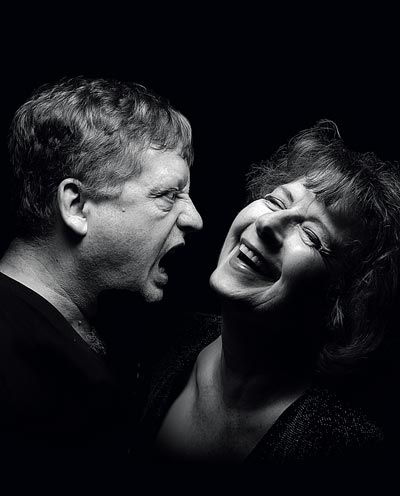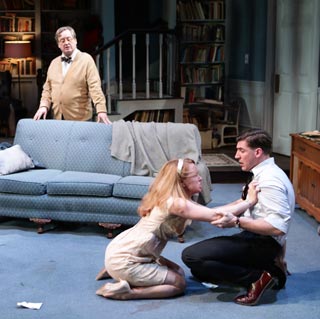Play (1962)
by Edward Albee
Directed by Scott Edmiston
Lyric Stage Company of Boston
Copley Square area
January 13 – February 12, 2017
Scenic Design: Janie E. Howland; Lighting Design: Karen Perlow; Sound Design: Dewey Dellay
With Steven Barkhimer (George), Paula Plum (Martha), Erica Spyres (Honey), Dan Whelton (Nick)

Paula Plum as Martha
in “Who’s Afraid Of Virginia Woolf?”
Photo: Nile Hawver
Courtesy of Lyric Stage Company of Boston
George (Steven Barkhimer) is a middle-aged associate professor of history at a small unnamed New England college and is married to Martha (Paula Plum), six years his senior and the daughter of the college president. They have, to say the least, a contentious relationship. Very late at night, after a party at the president’s house, a young, fellow academic, couple, Nick (Dan Whelton) and Honey (Erica Spyres), joins George and Martha at their home, drinks get poured, and all hell breaks loose.
This exceptionally good rendition of the full-length Albee play, which runs to three hours in three acts, is unyielding, heartbreaking and devastating. The relentlessness with which Steven Barkhimer’s George responds to baits planted by Paula Plum’s Martha, and the unprotected way in which they engage in open battle before the young visiting couple, is daunting, though completely engaging.
Albee is so unrestrained in his willingness to let attacks fly that all sense of decorum is lost immediately. No longer do academic rules of conduct apply; this is open warfare. As George and Martha go at it, and as Nick and Honey join in, the younger couple’s own vulnerabilities gradually reveal themselves and their own vehicles of unrestrained aggression get loosed upon the collective scene.
One is hard put to know, given the nature of the interactions, whether this is meant as an ordinary evening at George’s and Martha’s or whether, because of the involvement of the young couple and the issues they bring forth, this is a night unlike any other. To some extent, the intensity of the drama derives from that ambiguity, and one never really is certain whether the catharses that emerge throughout the course of the play signal a point of transformation or merely a bit of punctuation in an ongoing tragedy.
In either case, the setting is tragic, either as transformative or as enduringly punctuated, and the ferocity of the engagements, particularly between George and Martha, echoed by the younger couple, resounds painfully throughout.
The dialogue is funny because it is merciless, and the wit in it derives from the courageous lack of restraint shown by Albee and his characters. The ingenuity of the subtly unfolding plot devices is continually apparent, producing some considerable awe in the viewer at how craftily Albee manages to generate continuing dramatic interest over the course of a very long drunken evening.
The variations on sado-masochistic intrigue between George and Martha reverberate repeatedly and the devastating psychological currents created by that torrent threaten to suck up the young innocents at every turn.

Erica Spyres as Honey
Dan Whelton as Nick
in “Who’s Afraid Of Virginia Woolf?”
Photo: Mark S. Howard
Courtesy of Lyric Stage Company of Boston
The fact that these are academics becomes, as the denouement approaches, less and less significant, and the final genius of the staging and setting is that by a trick of clever lighting (by Karen Perlow) and stagecraft (with an ingenious set design by Janie E. Howland), the walls of books which serve as a kind of cultural insulation fade into the background.
This existentialist distillation of life entered from the academic standpoint pulls away the particularities of background and context to reveal something more pervasively and disturbingly human. With the literary buffers removed, literature and academic decorum no longer hide the rawness of human pain and the capacity to inflict it on the other in service of the struggle both towards, and away from, intimacy.
This production has the good fortune to bring together two of Boston’s premiere actors. Paula Plum and Steven Barkhimer, both well known to Boston theatergoers, are both masters of their craft. Plum’s range is wide; she has been featured in both dramatic and comedic roles in her long career. Barkhimer, who had been favored more frequently for comedic and clownish roles, has clearly demonstrated that he is also an excellent dramatic actor. The explosive chemistry between them in this production is evident, and their mutual capacities to be delicate and elusive at one moment and riproaringly aggressive in the next makes their elegant but horrific psychological dance so devastatingly effective.
Dan Whelton’s Nick is a potently drawn straight-arrow, slightly mean, young academic on the way up, which makes him the perfect foil for Martha’s sexual aggression and the perfect opponent for George’s wickedly insinuating posturings. One expects that Whelton’s Nick is going to explode into sexual or physical violence at a moment’s notice, igniting with one of George’s sarcastic prods or of Martha’s suggestive caresses.
Erica Spyres’ Honey is interestingly innocent without being clueless, mischievous without being malevolent, vulnerable without being mousy, and ultimately open to the wild ride despite her carefully creased clothes. Deftly, without too many words, she conveys the unexpected adventure of a young woman expecting a walk in the woods, getting caught in the crossfire of open battle, and jumping with gusto.
Great jazz (with sound design effectively done by Dewey Dellay) populates all the beginnings and endings, giving a sense of the free forms that hover on the edge of this angular academic horizon.
Written in 1962, Who’s Afraid Of Virgina Woolf? sits somewhere between the Beat generation and the Counter Culture, its academic bubble hovering on a sea that is in the process of great tidal shifts. In some sense, its little world screams out from its confines towards the greater social changes afoot. In another sense, that scream is more pervasively universal, highlighted by conflicting cultural forces, but resounding with more fundamental human anguish. With director Scott Edmiston’s deft guidance, along with an effective design team and a stellar cast, that dual significance reverberates throughout this stirring production.
– BADMan
Leave a Reply